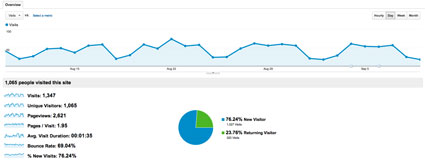Beware this vanity metric when evaluating your website’s effectiveness!
It’s tempting to track the number of “hits” your website gets; but is this data telling you anything worthwhile? Do website visits really tell you how effective your website is?
Website visits is a superficial metric -- it's only the tip of the iceberg. It's a "vanity metric" that paints an incomplete picture of what your business does right—or wrong—online and how that impacts your profitability.
What is a vanity metric?
Vanity metrics are data points that make your executives feel good, but don’t offer much insight to help savvy online marketers grow their businesses.
Vanity metrics provide an empty sense of accomplishment. Everyone rides the high while traffic is through the roof. Anyone—from your web designer (“People love this new feature we implemented!”) to your marketing team (“Our new Facebook campaign really paid off!”)—could take credit for the traffic.
As soon as traffic drops, though, everyone is quick to play the blame game. No one takes responsibility—and in a way, you can’t fault your team. No one actually knows the reasons behind the website’s success or failure.
Why are website visits a useless metric when evaluating website effectiveness?
At first glance, looking at website traffic provides a lot of data. That's great!
 Website traffic doesn't show the "big picture" when it comes to website effectiveness.
Website traffic doesn't show the "big picture" when it comes to website effectiveness....Or is it?
Do you know what marketing activity increased your traffic? Was it a new press mention? Was it a new Adwords campaign?
Do you know what action a visitor took once they arrived at your website? Did they make a purchase? Did they download a brochure or special presentation?
What causes dips in traffic? Have search engines changed their ranking algorithm? Have competitors been more aggressive with online or offline marketing?
Consider this true client story. Back in 2007, a client called and wanted help getting more sales from their website. During the course of our analysis, we discovered that the company was getting almost 14,000 visits per day, which isn't too shabby for a small business. Stop an analysis there, and you'd think the company was doing fairly well.
We dug deeper, though, and discovered that the conversion rate of their shopping cart was 0.02%. If you're an online sales pro, you know that's abysmal! So our task was to find out why their conversion rate was so poor and fix the problem. (As it turns out, their site was optimized for a phrase containing the word "free" and were getting lots of visitors looking for free items.)
You can see that on its own, the "website visits" metric doesn't show the “big picture" or give you actionable knowledge. You have to dig deeper for that data.
What metrics really matter?
KISSmetrics outlines identifies three questions that actionable metrics should answer:
- What are the key functions and benefits that people are coming to your website for?
- How do you gain or lose customers?
- How do you gain or lose revenue?
When you put together your marketing dashboard for the executives, consider the following metrics:
- Phone calls resulting from the website or online form submissions
- Email newsletter subscriptions
- Number of transactions
- Total revenue generated online
- Cost per lead (marketing expenses divided by leads generated online)
- Average order value (total revenue divided by number of transactions)
- PDF downloads
- Revenue or leads per visit
- Conversion rate (percentage of visitors that took a specific action, such as a purchase or lead form submission)
- Number of trial account signups
- Number of full account activations/upgrades
- Average length of account subscription
Ultimately, these more meaningful metrics will underscore bottom line performance and help your marketing team make decisions about campaign effectiveness, website design, landing page effectiveness, profitability and more. Remember, it's not how many people visit your website, it's how many of them take action.
What metrics do you use to evaluate website effectiveness?
~Shannon
Shannon is a Content Specialist at Rick Whittington Consulting
Share & Prove You Found It First
The Digital Slate
Looking for timely digital marketing and sales insights to grow your business? Subscribe to our monthly digital newsletter for marketing professionals.
Subscribe

